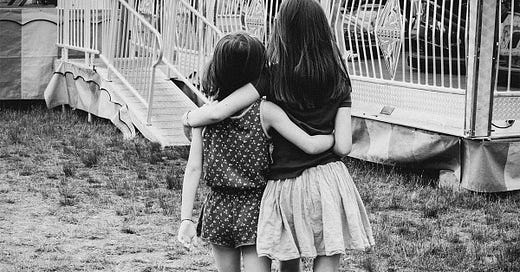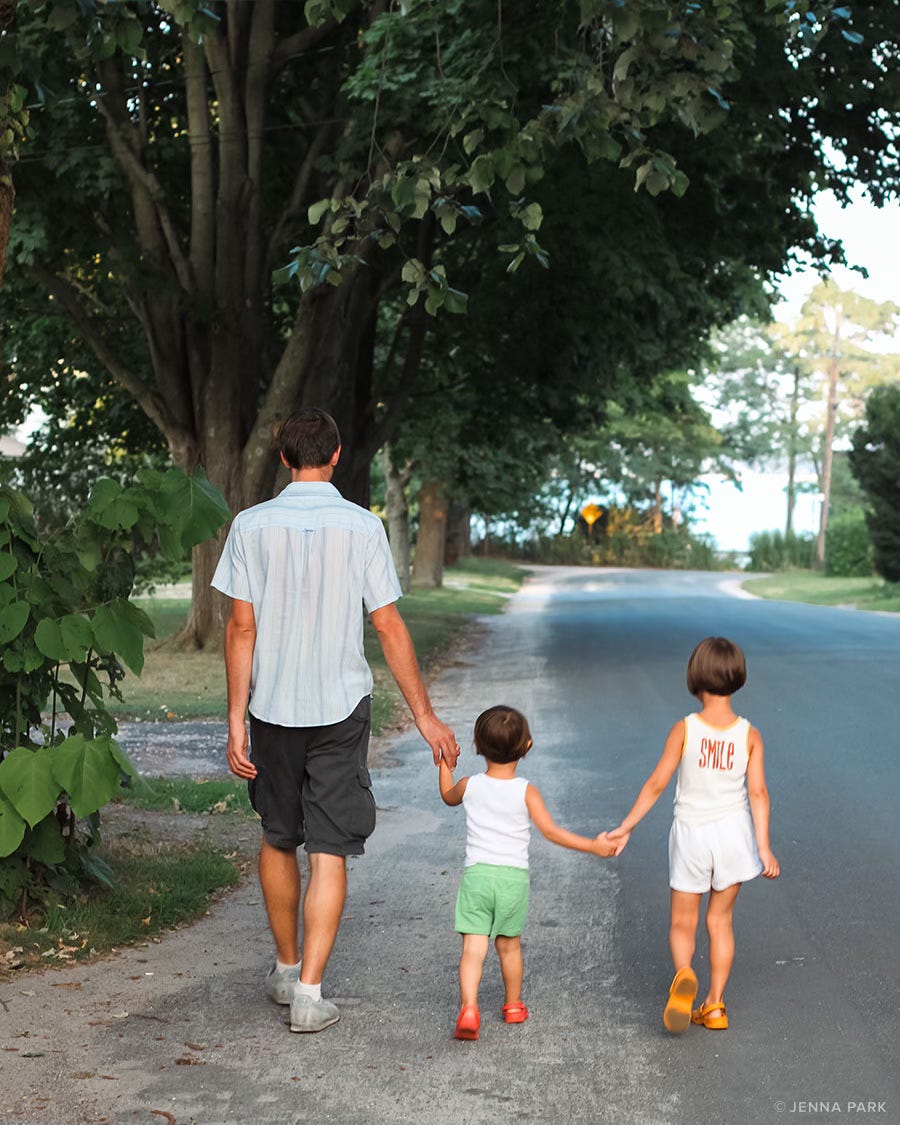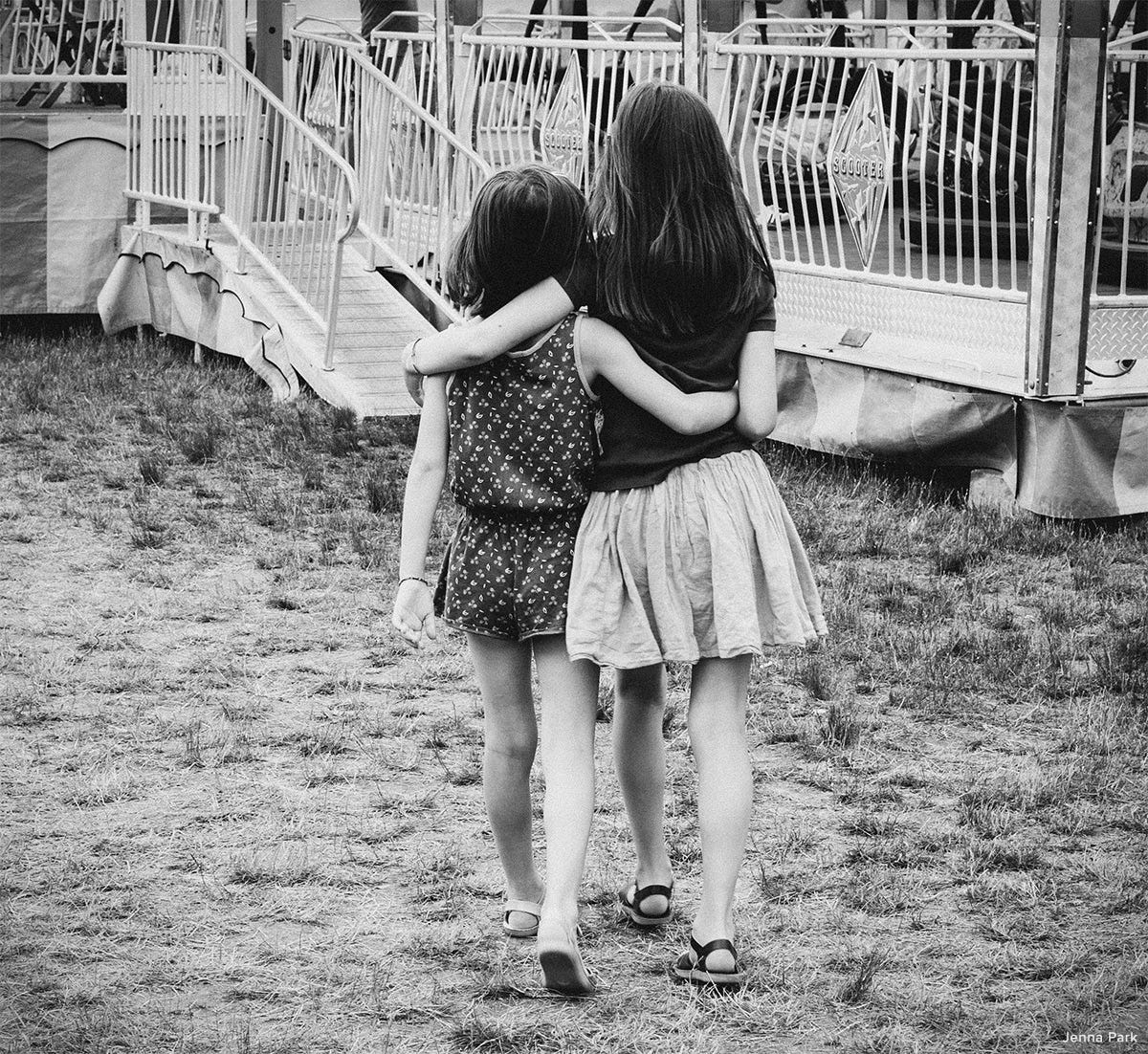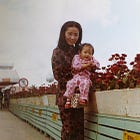Everybody wants daughters now, but is it progress?
Girl dads, girl bias, and capitalist feminism.
My family history is mostly filled with silence, but one of the few stories told to me by my mother is this: after delivering her fourth child on the floor of their home in Seoul, my grandmother kicked the newborn across the room after seeing that it was another girl.
Her aunt, who had helped deliver the baby, scrambled to retrieve the infant while my mother and her sisters looked on in bewilderment as my grandmother lay crumpled on the floor, heartsick with disappointment. She had desperately hoped it was a son. It was the only thing she believed could keep her husband from leaving the family.
He did, in fact, abandon them, though it isn’t clear if it happened after she gave birth to her third or fourth daughter. The fifth and final pregnancy, however, was the lucky charm. My uncle was born, but by then it made no difference. My grandfather had already started a new family with another woman.
It wasn’t uncommon, and was even socially acceptable, for husbands to leave their wives and start second families. There was a lot of shame for a woman who couldn’t produce a son. Women didn’t hold any social power, so they held their repressed rage in silence.
In Korea and China, the importance of birthing sons was rooted in Confucianism with its strict patriarchal social order. Add to that the needs of agrarian societies, the high cost of dowries, social advancement that was only possible through sons, and the importance of lineage inheritance—and girls were seen as an economic liability. When you met a family with many daughters, you could almost be certain it was because the mother had kept trying for a son.

I’ll never forget the first time I saw a photograph of a naked newborn girl, dead and abandoned like trash in a gutter on a busy street in China. Just as shocking were the onlookers captured walking by with apparent indifference. I think it was around 2001 when it was published in a Western newspaper about China’s one-child policy. The photo was apparently taken and leaked by a foreigner who stumbled upon that unsettling scene. It shocked me then and haunts me still.
You don’t need me to tell you how girls were once, and still are in parts of the world, viewed as expendable. Just look at the news. But female infanticide isn’t the only reason for the skewed gender ratio in Asia during the 80s and 90s. With the accessibility of affordable ultrasounds, sex selective abortions were especially widespread in East and South Asia.

According to The Economist, an estimated 50 million fetuses were aborted in Asia since 1980, simply because they were girls. That’s 50 million "missing" girls that could have been born. So when I recently came across that statistic in The Economist, alongside this article from Vox on how traditional son preference might be shifting, it immediately caught my attention.
For perhaps the first time in humanity’s long history, in many parts of the world it is boys who are increasingly seen as a burden and girls who are a boon.1
So everybody wants daughters now?
Apparently in the current narrative, girls are seen as less problematic and easier to raise. Girls are also statistically, at least in the U.S., more likely to attend college and more likely than boys to successfully launch into adulthood.
Forgive me if I’m rolling my eyes. So girls are only desirable now because girls are seen as outperforming boys in school and closing the pay gap in the workplace? Finally, in the irony of all ironies, what was once culturally considered the son’s duty to care for aging parents has now shifted to girls because they are seen as the more natural caretakers. We’re still stuck in gender stereotypes. This isn’t exactly a win for feminism.
Capitalist feminism isn’t universally liberatory when you think about how individualistic it is. Girlbossing your way to the top, while empowering, doesn’t address the structure of economic and social exploitation when it comes to all women, particularly those from mariginalized groups. It just invites a select few into existing power structures and leaves systemic oppression intact.
This cultural paradigm shift was clearly reflected in my grandmother, who in her old age would repeatedly tell me how lucky I was to have two daughters. “Daughters are so much better than sons. You’re so fortunate to have two girls.” This, coming from a woman who was pregnant every three years until she finally gave birth to a boy. Even at the end of her life, while suffering from advanced age-related dementia, she remained aware that it was her daughters who cared for her in her nursing home.
Maybe it was dementia speaking, but perhaps there was deep-seated guilt for her initial disappointment every time she gave birth to daughters. Perhaps I’m just projecting.
When I gave birth to my first child in 2004, my parents were thrilled that I was having a girl. When I had another two and a half years later, my father consoled me for not conceiving a son. He lived his life rooted in traditional cultural biases, but he soon grew to adore that second baby girl. I have no doubt that if I had a boy, I would have loved that baby equally (and perhaps the one miscarriage in-between my two children was a boy—I’ll never know), but I was relieved. I didn’t know a thing about raising boys and motherhood was intimidating enough.
Deep down in my dark well of secrets, I was secretly wishing for girls because of the patriarchal oppression and abuse that all the women in my family lived under. My dad didn’t abandon us for another family like my grandfather did, but he was still an absent father. Maybe that’s why I clung to the idea of having daughters, at the risk of sounding like some twisted, K-drama-style sense of retribution. Or maybe it was just misplaced logic born from generational hurt.
Eldest daughter notwithstanding, I understood at a young age what it meant to be a girl in my culture. My entry into the world was not planned, and in fact was the life changing accident that chained my mother to my father. As such, the first few years of my life was extremely turbulent. My late younger brother, however, was the crown prince of the family, a miracle baby who had defied the odds to be born. It’s not that I always felt overshadowed by him—I didn’t—but the expectations from each of us were never truly equal, even if the differences were rarely spoken aloud.
I missed the whole “girl dad” trend when it was at its peak a few years ago, probably because I’m not on TikTok. I’m not immersed in tropes like “thought daughter” or whatever the latest hyper-curated aesthetic lifestyle might be. But I think I would’ve watched those viral videos of dads in tutus or night-feeding their newborn daughters with some serious side-eye. I know it’s sweet, but I can’t help but feel like some of it is performative bullshit designed for social media.
My spouse would tell you that he was also secretly relieved to be raising girls. Not having a father figure present during his adolescent years due to divorce made him more comfortable around women. Being a father to girls was probably less pressure than raising sons, but I doubt he would have parented boys any different. Maybe he was making up for his own generational hurt.
Double standards for women and men will always exist, so I think the whole girl dad trend strikes me as a bit hollow. Mothers are expected to do the same parenting work without social media applause. Why are we praising the bare minimal display of parenting? Why are we celebrating what men should be doing, which is supporting the women in their lives?
In the U.S., sex selection with IVF is legal, something that it is not in other countries. It can be an ethical a gray area, though. Should we be able to choose daughters simply to avoid the possibility of raising boys who might embody toxic masculinity? Shouldn’t we be supporting our boys who are falling behind in education and struggling with loneliness instead? We see the cycle playing out right now in our current politics here and globally. There’s anti-feminist backlash as disempowered men see successful women as competitive threats to their power. This is what’s fueling regressive politics and giving rise to misogynistic influencers.
So if you want a girl, have a girl because girls are awesome—not because they’ll make better caretakers or because they’re finally able to achieve what boys were always able to achieve because they weren’t the discriminated sex. The pendulum of gender bias in births may be swinging the other way, but the cycle of exploitative capitalism and stereotypes repeats itself, and nothing fundamentally changes.
From the archives
Link roundup
To read:
Oh No, They Think My Father Is My Husband (NY Times)
Oh god, I remember the first time this happened to me when I was in my mid 20s. I was mortified.A Black Hole of Energy Use': Meta's Massive AI Data Center Is Stressing Out a Louisiana Community (404 Media)
Right. Who exactly is going to pay for these energy infrastructures? Just take a guess.Václav Havel on How to Hold Your Failure (The Marginalia)
“Admitting failure, especially moral failure, is hard enough…Accepting it is even harder — but it is on the other side of acceptance that the true reward of failure is to be found.”This Is the Story of My Resignation From the Queens Museum: It’s a story about power, leverage, and fear during the first Trump administration, and also about the potential for solidarity and love in the second. (Hyperallegic)
Like Any Story, a Fortune Begins as a Blank Page (Electric Lit)
Lucianna Chixaro Ramos’ beautiful personal narrative about mothers and daughters and the quiet transformations of one summer.When my sister died, it wasn’t just her own childhood memories that disappeared. Mine did too (The Guardian)
I’ve always believed that siblings are the forgotten grievers.Zohran Mamdani topples Andrew Cuomo in NYC mayoral race (Politico)
It’s a local primary election, so why is it making headlines nationally? This is a huge upset fueled by grassroots support and a signal to established Democrats of a generational shift in the party’s future.
What I’m watching:
When Life Gives You Tangerines (Netflix)
Set in Jeju Island, this wildly popular K-drama released earlier this year, starts as a childhood romance, but explores the complexities of family relationships, parental sacrifices, and community as it follows one woman’s journey in post-Korean War South Korea. Make sure you have tissues on hand.











This has been so much on my mind lately! Thank you so much for writing and researching about it.
When we first found out we were having a girl at week 10 through a blood test, my MIL did not completely trust it (never mind that she is a physician herself lol). She was hoping that the test was not 100% accurate. By the time we did the ultrasound scan at week 20, she still asked if the gender was confirmed, even though we had already told her 10 weeks prior. Even now, she still tells her friends that"maybe" it's a girl and assures us that "A girl is good too, because an older sister could take care of a younger brother." This comment itself is just so problematic on so many levels. I know she will love her granddaughter dearly but the fact that she clearly shows a preference for a boy bothers me so much. I just couldn't believe that we are in this century, and these things still come up so close to home.
This is such good writing, Jenna. Everything that I thought about commenting on as I read, you addressed in a subsequent paragraph: from the bare minimum of parenting shown by "girl dads" for the social media clout, to how the preference for daughters over sons these days feels like an avoidance of responsibility to raise sons who are empathetic and sensible and supportive of the women around them.
On one side of my family, my grandparents had a similar path of having three daughters before getting their long-sought-after son, who was the treated like royalty compared to the daughters. Even though I knew about it in my family history and at least theoretically with my awareness of the one-child policy, it was jarring to read the individual consequences you wrote about here: the kicked daughter, that photograph of the abandoned newborn girl, the 50 million girls lost before they could enter this world. So many tragedies here.